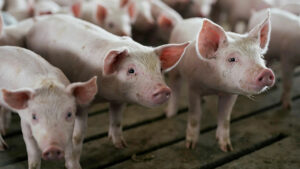
Livestock, poultry production seen falling next year
By Adrian H. Halili, Reporter
LIVESTOCK and poultry production are expected to decline next year with imports admitted under lower tariffs discouraging producers from expanding, according to the Philippine Chamber of Food, Inc. (PCAFI).
“We have a negative growth outlook for the livestock and poultry sector next year affecting both backward linkages like corn production and forward linkages in the value chain,” PCAFI President Danilo V. Fausto said in a Viber message.
The Department of Agriculture has said that it plans to raise livestock production levels by five times in 2028.
According to the Philippine Statistics Authority, hog and goat production rose 3.3% and 0.1%, while dairy output fell 12.4%, as did that of cattle (-1.5%), and carabao (-0.3%), during the third quarter.
Mr. Fausto said that the recent extension of a lower tariff regime on imported meat will set back the livestock and poultry industry.
“Basically, imports will hurt livestock production especially now that lower import tariffs have been extended for another year,” Mr. Fausto said.
Executive Order 50 extended the lowered Most Favored Nation tariff rates on rice, corn, and pork until Dec. 31, 2024.
The rates on pork meat, whether fresh, chilled, or frozen were kept at 15% for imports within the minimum access volume (MAV) quota and 25% for those exceeding the quota.
Tariff rates for rice imports remained at 35% regardless of their source country or volume.
Corn shipments, on the other hand, were kept at 5% for shipments within the MAV quota and 15% for those exceeding the quota.
“Our livestock producers will find it difficult to compete with imported meat and poultry products which are highly subsidized by exporting countries,” Mr. Fausto added.
As of October, meat imports amounted to 1.02-billion kilograms, according to the Bureau of Animal Industry (BAI).
The BAI reported that Brazil was the top supplier, accounting for 343.86 million kg. This was followed by the US and Spain with 179.64-million kg and 123.36-million kg, respectively.
Meat Importers and Traders Association President Jesus C. Cham said that lower costs for acquiring meat could potentially lower retail prices.
“A lower-cost environment will always provide a better cushion against price increases. This will benefit consumers,” Mr. Cham said in a Viber message.



